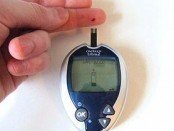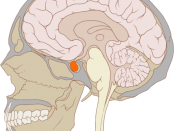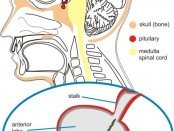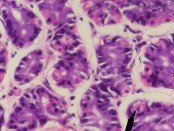Hormones and Metabolism
Metformin and Other Diabetes Drugs
What is Metformin? Metformin belongs to a class of drugs known as biguanides which are used to treat diabetes mellitus (sugar diabetes). Biguanides were developed from guanidine which was extracted from a plant known as Goat’s rue. It was used to treat diabetes in medieval Europe. Phenformin was the first clinically >> Read More ...
Sulfonylurea (Glimepiride, Glyburide, Glipizide) Drug Information
What are sulfonylureas? Sulfonylureas were the first oral medication to be used for treatment of diabetes mellitus (sugar diabetes). It encompasses a group of sulfonamide-related chemicals that can stimulate the release of insulin from the beta cells in the pancreas. Sulfonylureas are therefore known as insulin >> Read More ...
Growth on the Pituitary Gland | Types of Pituitary Tumors
Growths on the pituitary gland are usually benign tumors although a malignancy is possible yet rare. The most common growth on the pituitary gland is a pituitary adenoma. Other benign tumors may stem from areas around the pituitary gland and invade the pituitary parenchyma or apply pressure on the gland. Benign pituitary >> Read More ...
Pituitary Gland Disorders and Types of Pituitary Problems
As the “master gland”, most of the effects of the pituitary gland is on the other endocrine glands of the body. Disorders of the pituitary gland is often only detected by the signs and symptoms of various diseases attributed to these other glands. Pituitary gland problems can be seen either as an excess or >> Read More ...
Pituitary Gland Anatomy, Location, Hormones and Pictures
What is the Pituitary Gland? The pituitary gland is considered as the master gland of the body because its hormones control other endocrine glands, which in turn influence various and diverse activities in the body. It is largely influenced by the hypothalamus, which is the control center that processes the incoming >> Read More ...
Endocrine Diseases and Disorders General Signs & Symptoms
The endocrine glands secrete hormones that have a wide variety of actions in the human body. It is essentially the body’s regulating mechanism and can affect almost every process in the body. This is discussed further under the Human Endocrine >> Read More ...
Human Endocrine System, List of Glands and Hormone Functions
What is the Endocrine System? The endocrine system comprises the multiple glands that secrete chemical messengers, known as hormones, into the bloodstream. These hormones may act on almost every cell of the body or it may be tissue-specific and only act on certain types of cells. The endocrine system is the body’s >> Read More ...
Diabetes Mellitus – Type 1, 2, Gestational ‘Sugar’ Diabetes
What is Diabetes? Diabetes mellitus is a syndrome of impaired glucose metabolism caused by a complete or partial deficiency of the hormone, insulin, and/or decreased sensitivity of the body’s tissues to insulin. This results in hyperglycemia – elevated blood glucose levels. The metabolism of fats and protein >> Read More ...
Gastric Acid Secretion – Production, Stimulation, Inhibition
The gastric glands, also known as the oxyntic glands, secrete hydrochloric acid (HCl), pepsinogen and intrinsic factor. These glands are made up of 3 types of cells : mucus neck cells which secretes mucus peptic/chief cells which secretes pepsinogen parietal/oxyntic cells which secretes HCl and intrinsic factor All these >> Read More ...







